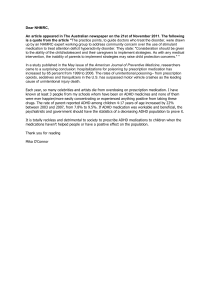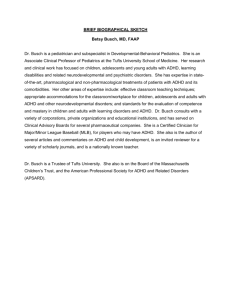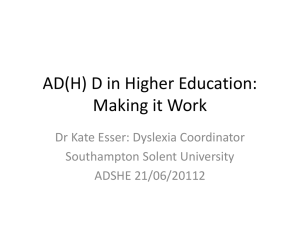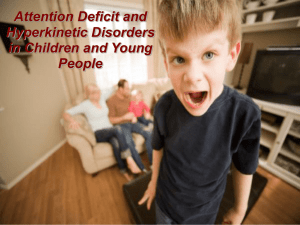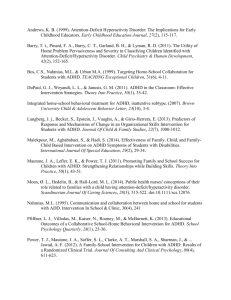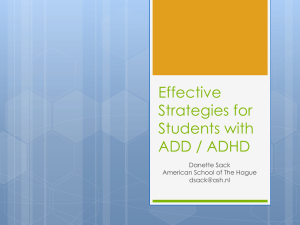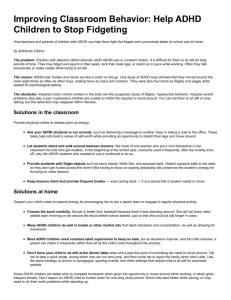Tips for Parents of Children with ADHD
advertisement
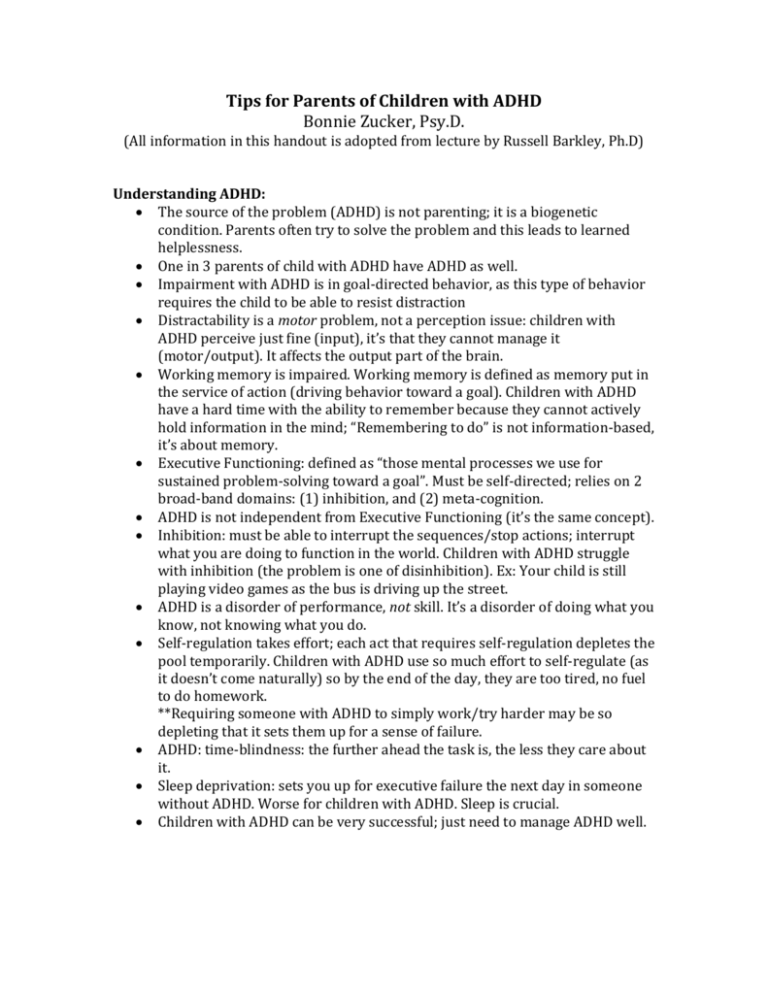
Tips for Parents of Children with ADHD Bonnie Zucker, Psy.D. (All information in this handout is adopted from lecture by Russell Barkley, Ph.D) Understanding ADHD: The source of the problem (ADHD) is not parenting; it is a biogenetic condition. Parents often try to solve the problem and this leads to learned helplessness. One in 3 parents of child with ADHD have ADHD as well. Impairment with ADHD is in goal-directed behavior, as this type of behavior requires the child to be able to resist distraction Distractability is a motor problem, not a perception issue: children with ADHD perceive just fine (input), it’s that they cannot manage it (motor/output). It affects the output part of the brain. Working memory is impaired. Working memory is defined as memory put in the service of action (driving behavior toward a goal). Children with ADHD have a hard time with the ability to remember because they cannot actively hold information in the mind; “Remembering to do” is not information-based, it’s about memory. Executive Functioning: defined as “those mental processes we use for sustained problem-solving toward a goal”. Must be self-directed; relies on 2 broad-band domains: (1) inhibition, and (2) meta-cognition. ADHD is not independent from Executive Functioning (it’s the same concept). Inhibition: must be able to interrupt the sequences/stop actions; interrupt what you are doing to function in the world. Children with ADHD struggle with inhibition (the problem is one of disinhibition). Ex: Your child is still playing video games as the bus is driving up the street. ADHD is a disorder of performance, not skill. It’s a disorder of doing what you know, not knowing what you do. Self-regulation takes effort; each act that requires self-regulation depletes the pool temporarily. Children with ADHD use so much effort to self-regulate (as it doesn’t come naturally) so by the end of the day, they are too tired, no fuel to do homework. **Requiring someone with ADHD to simply work/try harder may be so depleting that it sets them up for a sense of failure. ADHD: time-blindness: the further ahead the task is, the less they care about it. Sleep deprivation: sets you up for executive failure the next day in someone without ADHD. Worse for children with ADHD. Sleep is crucial. Children with ADHD can be very successful; just need to manage ADHD well. Treatment for ADHD: Medication: 80% of people with ADHD will be on medication at some point. Treatment with medication should be sustained, continued from childhood through adolescence. Behavioral treatment is essential. Behavioral treatment is needed to restructure natural settings to help the child with executive functioning. The goal is to make children with ADHD be accountable. Children with ADHD should not be excused for behavior! This does not prepare them for the world. Rather, give higher standards of accountability: more consequences, more expectations of accountability. The child’s outside or external environment needs to provide the structure, the executive function. Externalize important information; externalize deadlines- highlight the time periods related to tasks; break up long tasks into shorter onescreate many small steps; externalize mental problem-solving- write it all down; externalize sources of motivation- use a charted reward system. This restructuring should be designed to provide necessary cues to substitute for working memory deficits (ex: make signs, use lists, notecards, make charts). Use sticky notes, signs, cards, etc as prompts- to provide reminders to the child. Put everything in the child’s visual field: sticky notes all over; externalize important information. For older children, use digital recorders, personal journals, Watch-Minder watches, personal organizers, computer organizers. Make time physical, external, and obvious: use timers, clocks, counters. Break down future projects and goals into small, conquerable steps and do one step a day. Make the Event-Response-Outcome cycle smaller for the child: right now- do it right now! Don’t give long-term projects- do shorter ones right now. Use tokens, prizes, points, privileges, praise: make the motivation external. Give positive emotions with the reward. At least 80% of children with ADHD meet the criteria for another disorder (most commonly Oppositional Defiante Increase accountability to others: use frequent check-ins, regularly redirect your child to keep them focused on their work; regularly make sure the goals are being met. The environment needs to provide the external continuous reinforcement (as it doesn’t come from the child). Exercise is incredibly important. Children with ADHD respond best to regular exercise. It expands the tank- refuels the pool- so that your child has more to use to self-regulate. Advice from Dr. Barkley: “The compassion and willingness of others to make accommodations are vital to success.” Useful Websites: www.help4ADHD.org; www.russellbarkley.org The GOOD NEWS: ADHD is among the most treatable psychiatric disorders and has greater effectiveness for a larger percentage of cases. Tips for Managing Motor Vehicle Driving Risks Significantly higher risk when driving (citations, accidents, suspensions) Greater adverse impact of alcohol on driving Recommendations: Graduated license approach: daytime with adults, nighttime with adults, alone, with peers, full independence (3-6 months at each stage, gradual independence) At least 18 months of supervised driving NO CELL PHONES WHEN DRIVING!! Get device that blocks cell phone range in car: the Key2SafeDriving Device- a bluetooth transmitter on car key that shuts down driver’s cell phone (Professor X. Zhou); Accendo LC, Kaysville, Utah- $50 plus monthly service plan Increase monitoring when driving: chart intended vehicle use; random spot checking on destinations; critical incident cameras in vehicle (DriveCam Inc., San Diego, CA) or GPS car monitoring devices (MobileTeen GPS, AIG Insurance Co.) Behavior contracting for safe driving (Barkely Safe Driving Program, Compact Clinicals, Jones & Bartlett Publishing; Maureen Synder’s book on ADHD and driving, addwarehouse.com) Use medical management: extended release formulations with supplemental immediate release as needed; Must be in meds to drive (like Canadian law). Avoid alcohol use while driving (already impaired driving so even one drink will result in bad impairment) Tips for Managing Dating/Sexual Risks: At higher risk for earlier sexual activity and greater number of partners; higher rate of teenage pregnancy. Recommendations: Greater parental supervision of teen social and dating activities; delay couples dating and promote group dating instead; medicate on dates to reduce impulsive behavior and increase self-control; consider HPV immunization- to reduce risk of cervical cancer from increased rate of sexual partners. Discuss use of contraception with teens.
